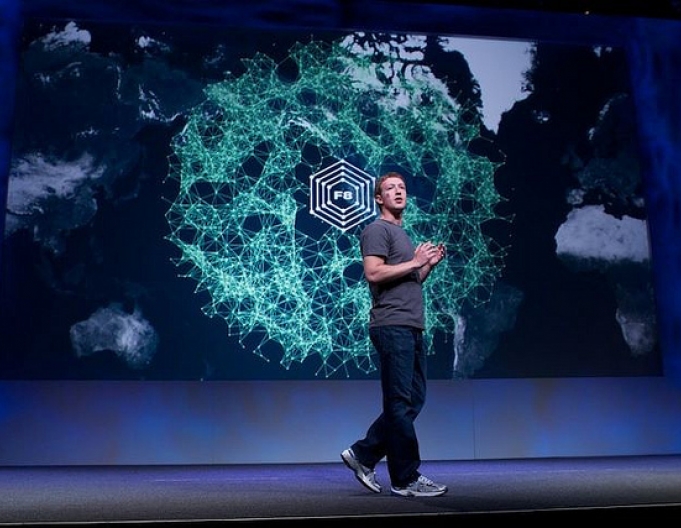Facebook is squaring with Google in a race for control not only of the social network market, but of the Internet as a whole. Regardless of who “wins,” there’s a danger for users, who bit by bit are losing control of both their digitial profiles – and digital freedom.
Do you like horse racing? We observers of the technology sector love it, only our horses are Apple, Google, Facebook and Microsoft. Who’s in the lead? Who’s getting more market share? Who has the best features? And in this winner and loser journalism of ours, innovations like the ones Facebook boss Mark Zuckerberg introduced at his annual F8 keynote get quickly relegated to one or the other category.
Some see Facebook‘s new functions as giving it an even wider lead against Google Plus. Others see the Zuckerberg portal as past its peak already and on the way down. Some predict that within a few years, Google Plus could actually push past the social network juggernaut.
But concentrating the conversation on the competition between these two giants misses the salient point: this latest Facebook overhaul has given us a clearer view than ever before of Mr. Zuckerberg’s vision of the future.
With its “Like” button, Facebook is part of the network behind the Internet — but the portal’s new orientation would mean that Facebook users no longer need the rest of the Net.
You want to listen to music, watch a movie? That will be possible on the new Facebook. What’s more, you can share the activity with your friends. The news? Users will be able to catch up on that too, without leaving Facebook.
Add to that a Timeline – individual, chronologically meticulous digital biographies — and the transformation of things we do in real life into Facebook apps. By way of example, Zuckerberg gave a Nike application that records your jogging route via smart phone GPS and recreates it in map form.
Let’s leave privacy issues out of it, and assume the best case scenario, which is that every single Facebook user understands what registering that kind of information on Facebook servers means (while hoping, of course, that the data-managing giant will soon be forced to become more transparent with regard to the ways it uses the information). Let’s also leave moral issues out of it. The fact of the matter is that Facebook and Google are quite simply out to market information that will make the value of their companies go up.
The world as Facebook interface
Let’s look at the consequences that a Facebook or Google world would have for the Internet. One web developer I know put it like this: “I sure wouldn’t want to be in the position of only having Google or Facebook APIs to program.” (APIs are the programming interfaces via which developers can create software for Internet services.)
The more powerful the great monocultures get, the greater their pull. That is more than clear on the social web: there is hardly a company, artist, or user who isn’t on Facebook, and there are very few platforms that don’t use the Facebook “Like” button.
You could just chalk up to chutzpah Zuckerberg‘s plans to create a Facebook universe that nobody ever has to leave, because everything’s already in it, including what happens in real life.
But the truth of the matter is that the move is meant to increase the market power of his company. What he’s saying is: If all users were only to use Facebook, then all and any sectors that make money from the Internet have to be a part of it too. And not only with fan pages and “Like” buttons, but with Facebook clones of their own websites — with Facebook dictating the terms.
Common sense, meanwhile, dictates that such overweening plans are doomed to failure. Do I really need a complete online chronicle of my life on Facebook servers? Do I really want my jogging routes to be recorded and made available to others? Is absolutely everything that we do “social,” as Mark Zuckerberg seems to imagine? All we really wanted to do was stay in touch with friends, have some fun exchanges and maybe upload a few pix.
Facebook is after two things. One, it wants a complete picture of our digital user behavior. Two, the company is counting on us recording our daily activities on various Facebook apps so they are available via the platform. They’re betting on a fundamental change of user behavior – just as Google once bet on search as the anchor of web navigation.
If Facebook is right, it will become difficult for people to opt out of Facebook or leave their digital Facebook identity behind. An open, decentralized web would lose much of its importance, and users would have fewer options. The same thing holds true if Google Plus “wins:” Let’s face it, our searches, and often contacts, e-mails, agenda, and documents, are already stocked in the search giant’s servers.
Still, the beautiful truth is that We, the users of the Internet, have the choice. On the one hand there’s the convenient route – that of the identity monopolists – that could do permanent harm to our digital eco-system. The other route isn’t as comfortable: that’s the one that involves parceling our data out to various services or even managing it ourselves from our own server at home.
If we hope the Internet will stay as open and varied as it has been until now, we should opt for the less convenient route.
